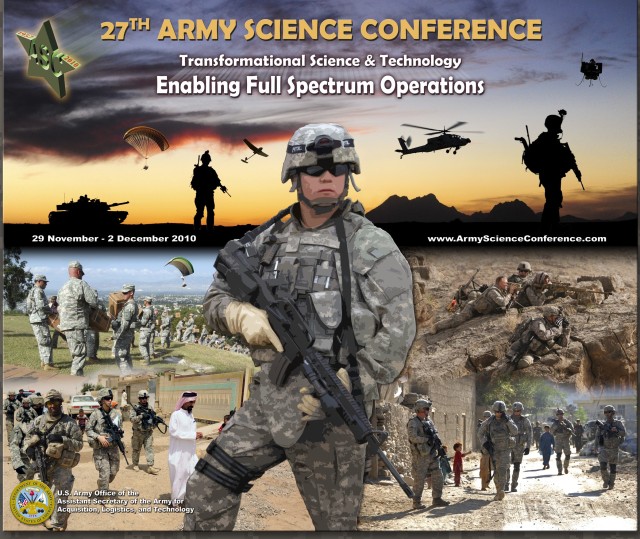The U.S. Army's Technical Program Committee is now reading hundreds of
two-page summary abstracts proposing paper topics for the upcoming 27th
Army Science Conference titled "Transformational Science and Technology
-- Enabling Full Spectrum Operations."
The abstracts, which must present original work from scientists and
engineers from the U.S. and foreign governments, academia and industry,
are to align with one of 18 S&T categories slated for the conference,
ranging from Sensors and Information Processing, to Lethality
Technologies, Power and Energy, Force Protection/Survivability,
Biotechnology, Nanotechnology, Network Science and Neuroscience, among
others.
The papers selected will represent a range of the best scientific
thinking in key areas of Army development such as robotics, computing
technology, Command Control Communications Intelligence Surveillance and
Reconnaissance (C4ISR), medical advances and more.
The Conference is squarely focused on producing results and advanced
capabilities which give Army soldiers a decisive edge over their
adversaries across the full spectrum of conflict -- a spectrum which is
likely to include continued engagement in hybrid warfare.
"This conference provides the opportunity for Army scientists and
engineers to grow personally and professionally by engaging in
discussions with world leaders in fields of research relevant to the
U.S. Army," said Dr. Thomas Killion, Deputy Assistant Secretary of the Army for
Research and Technology, the Army's Chief Scientist. "Investing wisely
in our people with innovative ideas is our best hope for catching
unexpected discoveries and providing our Soldiers the technology edge."
The goal of the 27th Army Science Conference, to be held in Orlando,
Fla., November 29 through December 2, is to present a forum where
scientists and engineers from anywhere in the world who are working on
or are interested in addressing U.S. Army challenges can openly and
freely discuss the latest advances in research covering disciplines
relevant to the U.S. Army mission, become aware of the latest ideas
being proposed in their fields of research and acquire new knowledge
through dialogue and discussion.


Social Sharing